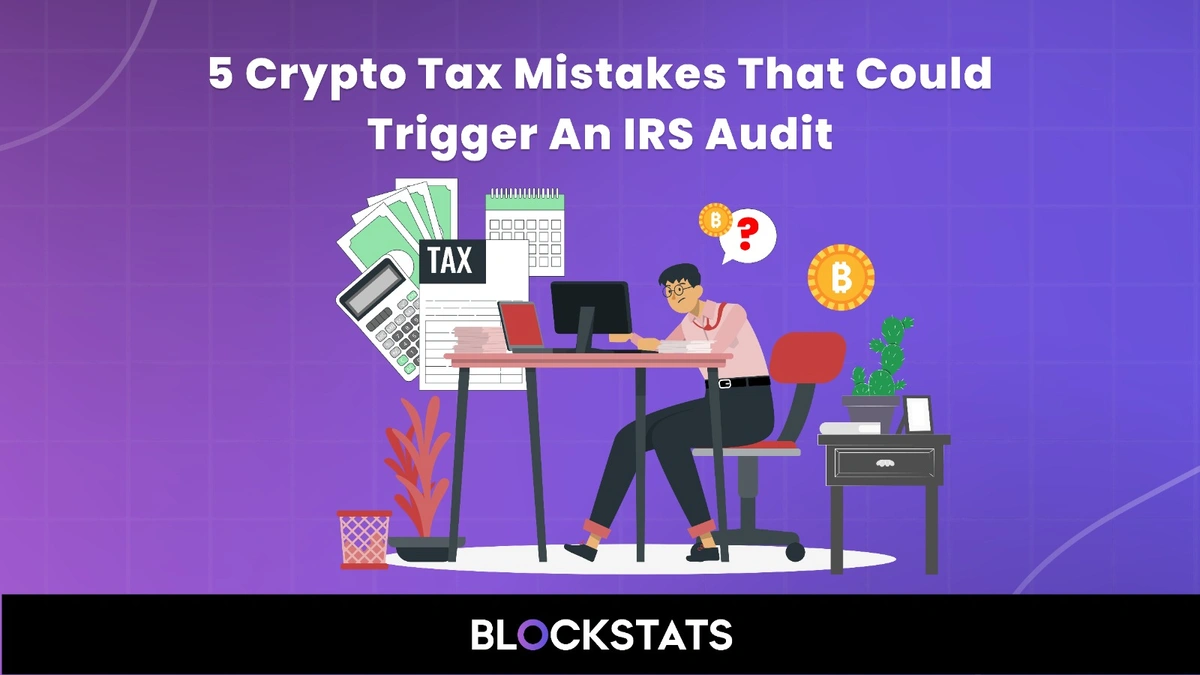5 Crypto Tax Mistakes That Could Trigger an IRS Audit
Cryptocurrency may feel like the Wild West, but to the Internal Revenue Service (IRS), it is taxable property, and they are watching it more closely than ever.
In recent years, the IRS has increased scrutiny on crypto investors, especially as digital assets become mainstream. Failing to properly report crypto gains, income, or holdings can trigger red flags and potentially a full-blown IRS audit.
If you are investing, trading, staking, or earning cryptocurrencies in any form, Blockstats outlines 5 critical tax mistakes you must avoid to stay compliant and reduce your audit risk.
1. Not Reporting Crypto at All
The Mistake:
Thinking that the IRS would not notice, especially if you are only using decentralised platforms or international exchanges and choosing not to report any crypto activity.
Why It’s a Red Flag:
Since 2019, the IRS has included a direct question on Form 1040 asking if you received, sold, sent, or otherwise acquired digital assets. Failing to answer this truthfully is considered tax fraud.
The IRS also works with major exchanges like Coinbase, Kraken, and Binance, receiving user data through 1099 forms and legal summons. If they know you are trading, and you don’t report, that is a huge red flag.
How to Avoid It:
Always disclose crypto-related activity, even if it is minimal. Use crypto tracking tools like Blockstats to pull your transaction history and ensure your records are complete.
2. Misclassifying Income vs Capital Gains
The Mistake:
Treating all crypto profits the same or worse, not understanding the difference between income and capital gains.
Why It’s a Red Flag:
Crypto transactions fall under different categories for tax purposes:
-
Trading and selling crypto = capital gains/losses
-
Mining, staking, airdrops, yield farming rewards = ordinary income
Reporting everything as either gains or income could lead to miscalculations and underpayment — both of which increase your risk of an audit.
How to Avoid It:
Use crypto tax software like Blockstats or consult with a crypto-savvy tax advisor. Accurately classify each transaction type, and keep detailed records showing how each asset was acquired and disposed of.
3. Not Tracking Cost Basis Accurately
The Mistake:
Failing to track how much you originally paid for your crypto (the cost basis), especially when transferring assets between wallets or exchanges.
Why It’s a Red Flag:
Without accurate cost basis data, you might over-report gains or under-report losses. This inconsistency can lead to discrepancies in your return, and the IRS uses algorithms to flag mismatched data.
For example, if you sell 1 ETH but do not document when or how you acquired it, the IRS might assume your gain was higher than it really was.
How to Avoid It:
Always track:
-
Purchase price (in USD)
-
Acquisition date
-
Exchange or wallet used
Use tools like Blockstats, Koinly, or CoinTracker to automate cost basis tracking across all platforms.
4. Ignoring DeFi and NFT Activity
The Mistake:
Assuming the IRS does not know or care about DeFi transactions or NFT trades so you don’t report them.
Why It’s a Red Flag:
Every time you swap tokens on Uniswap, earn yield on Aave, or sell an NFT, you could be triggering a taxable event. Many investors overlook these because they are not using traditional exchanges.
However, blockchain activity is public. The IRS has blockchain technology and analytics partners to monitor wallets and smart contracts, often linking your wallet to your identity.
How to Avoid It:
Log all activity in DeFi protocols and NFT marketplaces. Treat token swaps, LP exits, NFT mints/sales, and reward claims as taxable events and report accordingly.
5. Underreporting or Omitting International Crypto Accounts
The Mistake:
Keeping funds on non-U.S. exchanges (like KuCoin, Bitget, or Bybit) and assuming they’re outside the IRS’s jurisdiction.
Why It’s a Red Flag:
Holding crypto on foreign platforms could trigger FBAR (Foreign Bank Account Reporting) or FATCA requirements if the account exceeds certain thresholds.
Omitting these accounts or failing to declare foreign crypto income — could be seen as intentional evasion, which carries steep penalties.
How to Avoid It:
If you hold over $10,000 in crypto on foreign exchanges at any point during the year, you may need to file an FBAR (FinCEN Form 114). Keep records of balances and consult a tax professional familiar with crypto and foreign reporting laws.
Stay IRS compliant & simplify crypto tax filing with Blockstats
Crypto taxes are not optional, and the IRS is ramping up enforcement through better technology, data sharing, and regulatory pressure. If you want to avoid audits, penalties, or legal issues, it’s critical to:
-
Stay informed about how crypto is taxed
-
Track all your activity (even small transactions)
-
Use trusted crypto tax tools like Blockstats
-
File honestly and on time
By avoiding these 5 common mistakes, you will not only reduce your risk of an IRS audit, but you will also gain peace of mind knowing your crypto finances are on solid legal ground.
